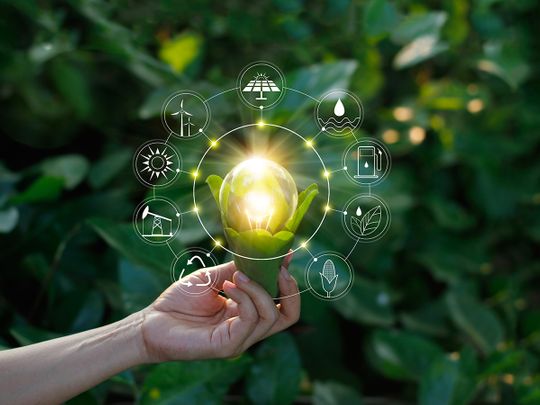
COP28: UAE’s commitment to sustainability
The declaration made during COP28 to reduce the production and consumption of fossil fuels by the year 2050 deserves appreciation (“COP28: UAE unites the world on climate deal”, November 13). To bring about substantial change, managing greenhouse gas emissions, developing climate resilience through stronger climate adaptation, and promoting economic growth is imperative. The UAE’s commitment to the Paris Agreement, which aims to limit global temperature rise below two degrees Celsius, is commendable. Energy conservation should be our foremost concern, and it should be obtained from clean sources to eliminate the use of fossil fuels and reduce carbon dioxide emissions. This approach will pave the way for sustainable development and help create a cleaner environment for future generations.
From Mr Eappen Elias
UAE
Using sustainable fuel
It is crucial to reduce our dependence on fossil fuels and shift towards utilising sustainable fuel sources, particularly when it comes to transportation (“COP28: UAE Consensus marks ‘beginning of the end’ of fossil fuel era: United Nations”, Gulf News, December 13). Using sustainably fuelled vehicles, such as electric cars or those powered by renewable energy sources like solar or wind, can significantly minimise the negative impact of transportation on the environment and help preserve our planet for future generations.
From Mr Nathan George
Facebook comment
Save money on Dubai Metro
As part of my budget planning, I started travelling on the Metro and found out that travelling on the Dubai Metro is a more cost-efficient option compared to other modes of transportation in the city (“RTA travel pass: How you can take unlimited trips on the Dubai Metro”, Gulf News, July 28). It not only saves money but also saves time and energy. The Metro has modern facilities and provides commuters with a comfortable and safe ride. The trains are punctual and run frequently, making planning your day easy and travelling around the city hassle-free. Moreover, the Metro stations are conveniently located throughout the city, making it easier for me to reach my destination without worrying about traffic or parking. All in all, I now prefer travelling in Dubai Metro as it is a reliable, comfortable, and cost-efficient mode of transportation.
From Mr Bijo Mathew
UAE
Joy of tea!
International Tea Day is celebrated every year on December 15 in tea-producing countries such as Bangladesh, Sri Lanka, Nepal, Vietnam, Indonesia, Kenya, Malawi, Malaysia, Uganda, Tanzania, and India. The day aims to raise awareness about the impact of the tea trade on workers and growers. Tea is the second most popular beverage in the world after water and comes in various types, including white, black, green, oolong, herbal, and pu’er. The first International Tea Day was held in New Delhi in 2005, and in 2015, the Indian government proposed to the UN Food and Agriculture Organisation to expand its celebration globally. The theme for this year’s International Tea Day focuses on promoting pollinator-friendly agricultural production.
From Mr Jubel D’Cruz,
Mumbai, India
Surge in cost of living
As we approach the end of 2023, it is clear that the world is still facing a major economic challenge - inflation. It is a phenomenon where the general price level of goods and services in an economy increases and the purchasing power of money decreases. This can be due to various factors, such as an increase in demand for goods and services, a decrease in the supply of goods, or a decrease in the value of money. It’s a tough time for everyone as prices of essential goods like food, housing, and healthcare are skyrocketing, while salaries and wages are not keeping up with the increasing cost of living. The middle class and low-income households are the most affected, as they find it harder to make ends meet. The rise in inflation can have a ripple effect on the economy. It can lead to a decrease in investment, higher interest rates, and a decline in economic growth. Central banks and governments are taking various measures to control inflation, such as increasing interest rates, reducing government spending, and implementing policies to increase the supply of goods and services. We can also take certain steps to cope with the effects of inflation. We can reduce our expenses by cutting down on non-essential items and finding ways to save money. We can also look for alternative sources of income or negotiate for a salary increase. Inflation is a major economic challenge that the world is facing today. It’s a tough time for everyone, and we can only hope that things will start to improve soon. However, by taking some proactive measures, we can mitigate the impact of inflation on our lives and the economy.
From Mr Hari Shankar
UAE
Editor’s note: Is there a news report that you feel strongly about? Something that has to be addressed in the community and requires resolution? Email us on readers@gulfnews.com. You can also post a comment on our Facebook page or tweet to us @GNReaders.








